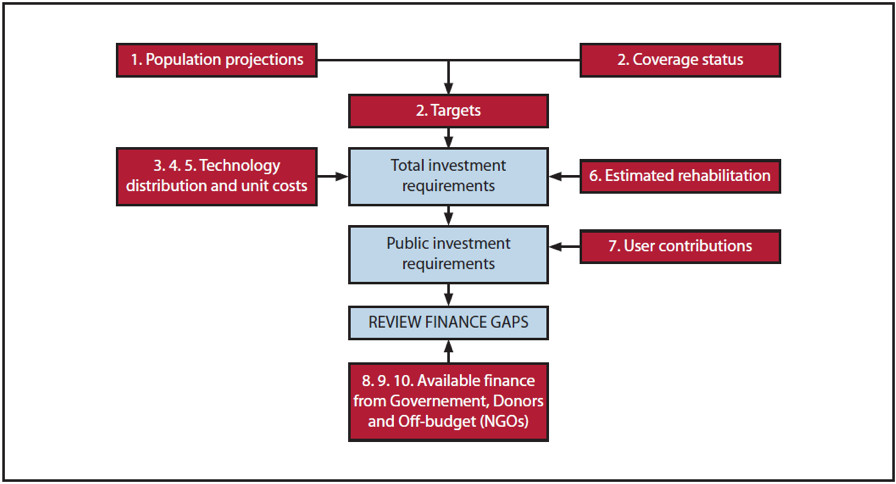Difference between revisions of "MDG Costing and Financing"
(Created page with "__NOTOC__") |
(→Key documents) |
||
| (8 intermediate revisions by the same user not shown) | |||
| Line 1: | Line 1: | ||
| − | __NOTOC__ | + | __NOTOC__ <small-title /> |
| + | [[Image:WSP logo.png|right|120px|link=http://www.wsp.org/]] | ||
| + | The [http://sustainablewash.org/resource/tool-11 Millennium Development Goals (MDG) costing and financing spreadsheet] developed in 2005 by the Water and Sanitation Program (WSP) is part of the Millennium Development Goals Country Status Overview (CSO) reports on water and sanitation. | ||
| + | |||
| + | |||
| + | '''The CSO reports intend to support''' (Fonseca et.al., 2011): | ||
| + | |||
| + | * improvements in the design of demand-driven and results-oriented national programmes; | ||
| + | * coordination of water and sanitation programmes and projects, by analysing current gaps; and, | ||
| + | * enhanced cooperation for proper implementation of programmes and projects based on peer review and strategic assessment. | ||
| + | |||
| + | <br> | ||
| + | {|style="border: 1px solid #DB87C9; text-align: left; background-color: #efefef" align="none" width="70%" | ||
| + | |Ultimately, these CSOs [...] should help African countries to align their national priorities with global targets on water supply and sanitation, in terms of policy reforms, institutional change, and resource allocation and to link country efforts to existing supportive regional frameworks (WSP, 2011). | ||
| + | |} | ||
| + | |||
| + | |||
| + | <br> | ||
| + | '''Figure 1. Quantitative analysis to support the country status overviews''' | ||
| + | [[Image:MDG fg. 1.jpg|thumb|none|600px|Source: Mehta et al. (2005)]] | ||
| + | |||
| + | |||
| + | The spreadsheet uses cost data from either national or regional/global publications to support the analysis of quantitative data and to prepare the illustrative tables and charts. The data is collected by a group of institutions including the African Minister’s Council on Water (AMCOW), the African Development Bank, national governments, NGOs etc., and the costs collected are assessed by broad-based consultative national platforms (Mehta, 2005). To calculate the investment or finance requirements for respective countries, the spreadsheet accommodates the use of MDG targets or country specific targets as described in Figure 1. The CSOs along with the relevant costing and financing spreadsheet aim to support the implementation of MDGs until at least 2015. | ||
| + | |||
| + | ===Key documents=== | ||
| + | * Fonseca, C., Dubé A. and Verhoeven J., 2011. [http://www.ircwash.org/resources/cost-based-decision-support-tools-water-and-sanitation Cost-based decision support tools for water and sanitation]. (WASHCost working paper 4). The Hague, The Netherlands: IRC International Water and Sanitation Centre. | ||
| + | |||
| + | * Mehta, M., Fugelsnes, T. and Virjee K., 2005. [http://www.ircwash.org/resources/financing-millennium-development-goals-water-and-sanitation-what-will-it-take Financing the Millennium Development Goals for Water and Sanitation: What Will it Take?] International journal of water resources development, 21(2) pp.239-52. | ||
| + | |||
| + | * WSP, 2011. [http://www.wsp.org/node/162 Is Africa on track to meet water supply and sanitation targets?] | ||
Latest revision as of 22:57, 19 May 2014
The Millennium Development Goals (MDG) costing and financing spreadsheet developed in 2005 by the Water and Sanitation Program (WSP) is part of the Millennium Development Goals Country Status Overview (CSO) reports on water and sanitation.
The CSO reports intend to support (Fonseca et.al., 2011):
- improvements in the design of demand-driven and results-oriented national programmes;
- coordination of water and sanitation programmes and projects, by analysing current gaps; and,
- enhanced cooperation for proper implementation of programmes and projects based on peer review and strategic assessment.
| Ultimately, these CSOs [...] should help African countries to align their national priorities with global targets on water supply and sanitation, in terms of policy reforms, institutional change, and resource allocation and to link country efforts to existing supportive regional frameworks (WSP, 2011). |
Figure 1. Quantitative analysis to support the country status overviews
The spreadsheet uses cost data from either national or regional/global publications to support the analysis of quantitative data and to prepare the illustrative tables and charts. The data is collected by a group of institutions including the African Minister’s Council on Water (AMCOW), the African Development Bank, national governments, NGOs etc., and the costs collected are assessed by broad-based consultative national platforms (Mehta, 2005). To calculate the investment or finance requirements for respective countries, the spreadsheet accommodates the use of MDG targets or country specific targets as described in Figure 1. The CSOs along with the relevant costing and financing spreadsheet aim to support the implementation of MDGs until at least 2015.
Key documents
- Fonseca, C., Dubé A. and Verhoeven J., 2011. Cost-based decision support tools for water and sanitation. (WASHCost working paper 4). The Hague, The Netherlands: IRC International Water and Sanitation Centre.
- Mehta, M., Fugelsnes, T. and Virjee K., 2005. Financing the Millennium Development Goals for Water and Sanitation: What Will it Take? International journal of water resources development, 21(2) pp.239-52.


